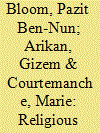| Srl | Item |
| 1 |
ID:
140168


|
|
|
|
|
| Summary/Abstract |
Somewhat paradoxically, numerous scholars in various disciplines have found that religion induces negative attitudes towards immigrants, while others find that it fuels feelings of compassion. We offer a framework that accounts for this discrepancy. Using two priming experiments conducted among American Catholics, Turkish Muslims, and Israeli Jews, we disentangle the role of religious social identity and religious belief, and differentiate among types of immigrants based on their ethnic and religious similarity to, or difference from, members of the host society. We find that religious social identity increases opposition to immigrants who are dissimilar to in-group members in religion or ethnicity, while religious belief engenders welcoming attitudes toward immigrants of the same religion and ethnicity, particularly among the less conservative devout. These results suggest that different elements of the religious experience exert distinct and even contrasting effects on immigration attitudes, manifested in both the citizenry's considerations of beliefs and identity and its sensitivity to cues regarding the religion of the target group.
|
|
|
|
|
|
|
|
|
|
|
|
|
|
|
|
| 2 |
ID:
120747


|
|
|
|
|
| Publication |
2013.
|
| Summary/Abstract |
This paper investigates the individual level factors that influence support for social redistribution and social policy in Turkey by focusing on the role of core values and religiosity. The analysis of data from Round 4 of European Social Surveys shows that self-transcendence and conservation values enhance support for government provision of social safety nets. Different aspects of religiosity have different effects on attitudes toward redistribution and social policy, with self-identified religiosity having a positive and social religious behavior having a negative effect on support for government responsibility in providing social insurance.
|
|
|
|
|
|
|
|
|
|
|
|
|
|
|
|